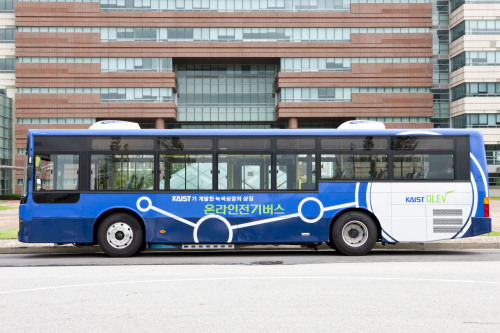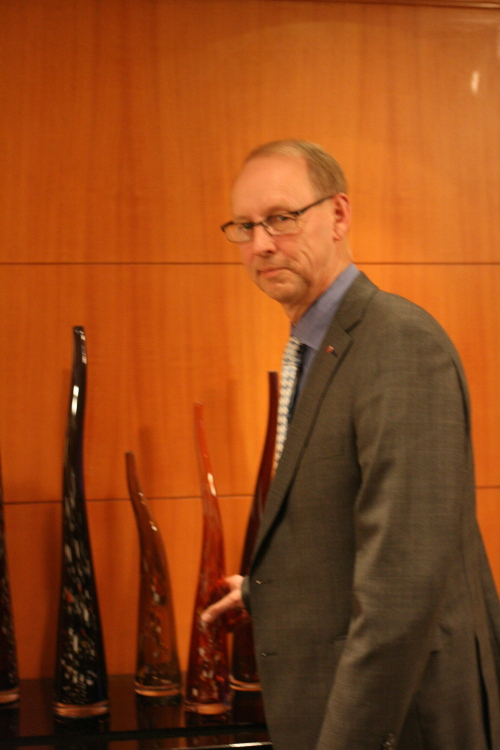Denmark has sought inspiration from Korea on how to connect the Scandinavian country’s cities using green transport.
Danish politician Per Seerup Knudsen visited the Korea Advanced Institute of Science and Technology to view cutting-edge Online Electric Vehicle (OLEV) technology.
“We found the research by KAIST very interesting because of what we want to do in Copenhagen,” he said.
The councilor for the Capital Region of Denmark said that green technology like the OLEV buses viewed at the KAIST science and engineering research hub in Daejeon could inform his government’s new green transport initiative.
Danish politician Per Seerup Knudsen visited the Korea Advanced Institute of Science and Technology to view cutting-edge Online Electric Vehicle (OLEV) technology.
“We found the research by KAIST very interesting because of what we want to do in Copenhagen,” he said.
The councilor for the Capital Region of Denmark said that green technology like the OLEV buses viewed at the KAIST science and engineering research hub in Daejeon could inform his government’s new green transport initiative.

The buses, which were listed among Time Magazine’s best picks for inventions in 2010, are powered wirelessly by an on-road energy supply while running, resolving the battery-life issues that blight some other forms of green transport.
The Danish region plans to start its project to link five cities surrounding Copenhagen by 2019. And the country eventually aims extend its green transport infrastructure to include other Northern European capitals such as Stockholm in Sweden, Bern in Switzerland, and Strasburg in Austria.
Knudsen said that he would also like to speak to Korean Air representatives in future to see if Korea could be one of ten new flight destinations Denmark is seeking in order to make Copenhagen a global transport hub and a gateway to Northern Europe.
He said: “Europe is too little for Denmark and Asia is too little for Korea, so I think in this way we can work well together.”

But he emphasized that any growth must first take environmental concerns into account.
“We think that it is necessary to think about a green way, not for our future but maybe because of our children’s future. There is no alternative,” he said.
“While the government wants growth in Denmark, we only want green growth. And infrastructure provides growth. If we don’t provide infrastructure we won’t have growth. We need to mobilize people.”
He said Korea’s reputation for research and President Lee Myung-bak’s visit to Denmark in May had encouraged his trip here.
“We know that Korea is eighth in the world for research output,” he said.
“We are number eighteen in the world. It’s not bad but we can learn something from Korea. Maybe we also can learn to get more outputs from our research.”
Copenhagen is already collaborating with Seoul to promote environmental stability along with economic growth via Korea’s Global Green Growth Institute and its regional office in Denmark.
While his trip also took in medical facilities as part of research for his country’s plans to build up to five new hospitals, Knudsen said there were many more areas of design for both countries to collaborate on.
Danish expertise in innovate green growth areas such as offshore wind farms yet to be tapped by Korea. Twenty percent of Denmark’s energy is delivered by windmills, while Korea has focused mainly on solar energy until now.
“We are interested in what Denmark can get from Korea and what Korea can get from Denmark,” he said.
By Kirsty Taylor (kirstyt@heraldcorp.com)
-
Articles by Korea Herald



![[AtoZ into Korean mind] Humor in Korea: Navigating the line between what's funny and not](http://res.heraldm.com/phpwas/restmb_idxmake.php?idx=644&simg=/content/image/2024/04/22/20240422050642_0.jpg&u=)
![[Exclusive] Korean military set to ban iPhones over 'security' concerns](http://res.heraldm.com/phpwas/restmb_idxmake.php?idx=644&simg=/content/image/2024/04/23/20240423050599_0.jpg&u=20240423183955)


![[Graphic News] 77% of young Koreans still financially dependent](http://res.heraldm.com/phpwas/restmb_idxmake.php?idx=644&simg=/content/image/2024/04/22/20240422050762_0.gif&u=)

![[Herald Interview] Why Toss invited hackers to penetrate its system](http://res.heraldm.com/phpwas/restmb_idxmake.php?idx=644&simg=/content/image/2024/04/22/20240422050569_0.jpg&u=20240422150649)






![[Exclusive] Korean military to ban iPhones over security issues](http://res.heraldm.com/phpwas/restmb_idxmake.php?idx=652&simg=/content/image/2024/04/23/20240423050599_0.jpg&u=20240423183955)



![[Today’s K-pop] Ateez confirms US tour details](http://res.heraldm.com/phpwas/restmb_idxmake.php?idx=642&simg=/content/image/2024/04/23/20240423050700_0.jpg&u=)